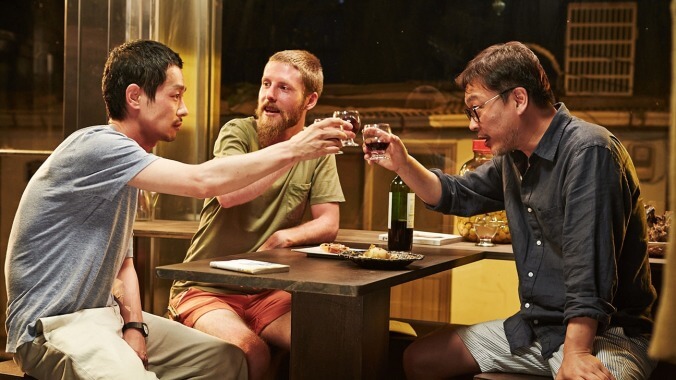Hong Sang-soo’s Hill Of Freedom is an ingeniously absurd comedy of miscommunication


A sly satirist of our graceless impulses and alternate realities, South Korean writer-director Hong Sang-soo cranks out perceptive, economized mini-dramas of miscommunication and missed connections at a remarkable rate—recycling and remixing a handful of plot points, following different versions of the same characters (sometimes within the same film), all with a gift for ingenious structures that has kept a career based on repetition from devolving into total monotony. Why his short feature Hill Of Freedom (one of two Hong movies to get a belated American release in the last week, the other being Yourself And Yours) has taken almost six years to get here is anyone’s guess; rarely has he distilled his favorite themes to more delightful effect. It may not be the heftiest or most penetrating entry in the Hong oeuvre, but it’s one of the funniest and probably the most accessible.
It also happens to be almost entirely in English, albeit with a twist: With the exception of a token American expat, none of the characters are native speakers. As is typical in Hong’s movies, these characters are also heavy drinkers who don’t know how to express or act on their feelings, to which the double-sided language barrier adds a further challenge factor, producing the kind of verbal comedy that is best appreciated by anyone who has had to learn or teach a language. Limited vocabulary creates its own repetitions and running gags that teeter on the edge of the Theater Of The Absurd: Everything is “great” or “beautiful,” and the phrasebook staple “Are you here for business or pleasure?” is heard with oppressive regularity.
But language is just one of the post-modern concerns at play in a movie that often appears deceptively simple and (considering its origins in a now distant era of indie digital film production) technologically crude. It begins with Kwon (Seo Young-hwa) receiving a stack of letters that were left for her by Mori (Ryo Kase), a Japanese tutor who flew to Seoul in a failed attempt to profess his love to her while she was away at a health retreat in the mountains. Mori doesn’t speak Korean, and his letters to Kwon (which are undated and written in English) amount to a diary of the days or weeks he spent waiting for her return, when he was staying at a hanok hotel in Kwon’s neighborhood and reading a book about the concept of time. However, after finishing the first letter, Kwon becomes faint or dizzy and drops the entire stack down a flight of stairs. The letters are now out of order, and at least one is missing.
When Kwon resumes reading, we find ourselves jumping from Mori’s first visit to her favorite coffee shop, Hill Of Freedom, to a scene of him being asked out on a date by the coffee shop’s owner, Young-Sun (Moon So-ri), sometime after he found her lost dog. The rest of Hill Of Freedom proceeds in similar fashion, relating—in non-chronological order—Mori’s fling with Young-Sun, his clumsy interactions with locals, and his boozy friendship with the hotel owner’s nephew, Sang-won (Kim Eui-sung, in a terrifically funny performance), in Hong’s trademark style of long takes punctuated by abrupt zooms. But if this framework seems unusually literal-minded by Hong’s standards, it’s still riddled with ambiguities. For one thing, we don’t know whether the lost letter was the last one written by Mori or just part of the middle; if it’s the latter case, then his story appears to end with him accidentally locking himself in a bathroom.
For another, it’s never made clear what prior relationship, if any, existed between Kwon and Mori, apart from the fact that they worked at the same language school about two years earlier. A possible way of reading all of this is as a crafty send-up of an old literary genre, the epistolary romance—the archaic clichés of mysterious maladies, fainting, and unrequited love mixing with Hong’s familiar haze of hangovers, cigarettes, and impolitic behavior. The illness that led Kwon to an extended stay in the mountains resembles romanticized depictions of tuberculosis. Yet it could just as well be a matter of mental well-being; her swoon after reading Mori’s first letter could be a panic attack, given the creepy circumstances. And despite his failed pursuit of a bold romantic gesture, Mori is a typical male protagonist in a Hong Sang-soo movie: obtuse, dislocated, needy.
In fact, neither the letters nor the dialogue tell us anything about his feelings for the woman he’s travelled so far to see. Are those recorded in the lost letter? Is it his rusty English? Hong wryly suggests that the answer to both questions is “no.” A recurring joke in Hill Of Freedom is that the conversations in Korean that Mori overhears (but doesn’t understand) largely consist of arguing, veiled jealousy, and phony pleasantries. Which is to say, if there’s a broader point being made here, it’s that a lack of eloquence or a shortage of the right words isn’t what obstructs our ability to communicate. It’s a matter of human nature.
If anything, the stiff English spoken by the characters forces them to over-emote. It makes them say things like, “You have a very beautiful mustache,” and, repeatedly, “You look like an artist.” (This is meant as a compliment.) Perhaps it’s no coincidence that the only phrase that Mori’s new buddy, Sang-won, knows in Japanese is “I love you,” though that particular detail is disclosed in a scene that is in all likelihood a dream sequence. As in Hong’s finest time-benders and excursions into surrealism (which include the likes of Right Now, Wrong Then and The Day He Arrives), a heightened reality doesn’t appear to be a happier or more perfect one. Even when they’re forced to communicate exclusively in romantic-sounding declarations and absolutes, his characters still manage to be evasive, fumbling, and surly. The joke isn’t just on them but on all of us.